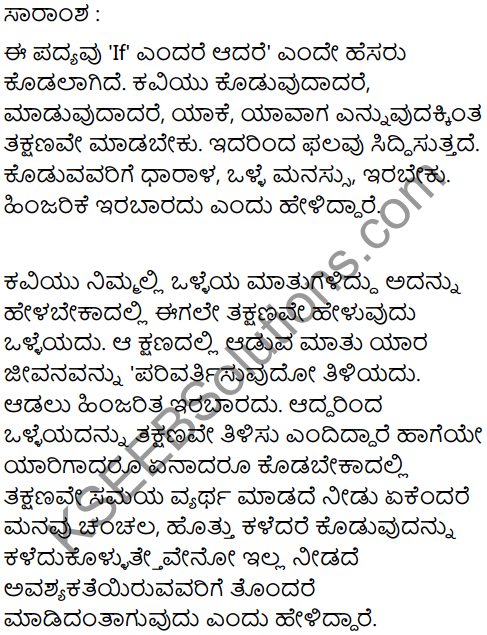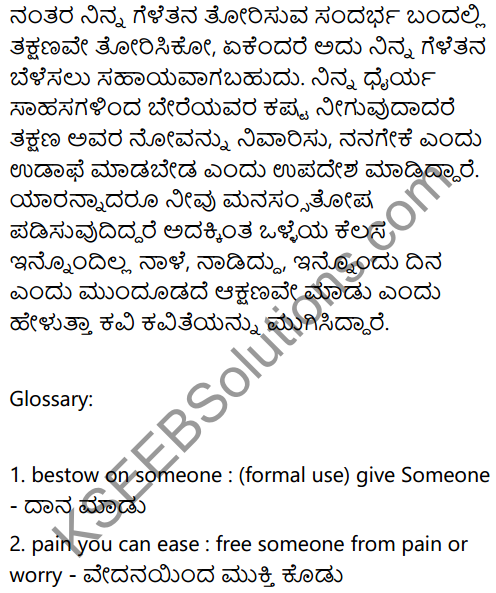KSEEB Solutions for Class 7 English Poem Chapter 2 If is available Online for students. Revise all the concepts of Chapter 2 If Questions and Answers easily taking help from the KSEEB Solutions. Download the KSEEB Solutions for Class 7 English PDF free of cost and get good scores in the board exams. English Chapter 2 If Questions and Answers, Summary, Notes Pdf, KSEEB Solutions for Class 7 English Karnataka State Board Solutions help you to revise complete Syllabus.
Karnataka State Board Class 7 English Poem Chapter 2 If
Enhance your subject knowledge through the KSEEB Solutions for Class 7 English If Questions and Answers lay a stronger foundation of your basics. Verify your answers with the Karnataka State Board Class 7 English Chapter 2 If with Answers provided and know where you went wrong.
If Questions and Answers, Summary, Notes
I. Answer these questions.
Question 1.
The poet is addressing a kind man.
Answer:
(True)
Question 2.
The poet is not talking about the good deeds that we can do.
Answer:
(Not True)
Question 3.
How can you make someone glad? Or someone less sad? Can you give an example each?
Answer:
Yes. We can make someone glad. We can make someone gald by uttering good words, kind words, helping someone who are in trouble, morally making them strong by giving all kind of support in critical condition, assuring them we will be always with them throughout their life in all their sorrows and happiness. Someone may be made less sad by building up courage to face any situation or least we can take them to a place where they can get solution to their problem.
Question 4.
The poet is saying you should praise people in order to gain favour.
Answer:
(Not True)
Question 5.
The poet is saying you have to be strong yourself to do good to others.
Answer:
(True)
Question 6.
a. The poet is assuming you may not have a forceful personality, b. The poet is advising you to develop a forceful personality. (Underline the True statement)
Answer:
b. The poet is advising you to develop a forceful personality.
Question 7.
Look at the good qualities given below
a. kindness; b. charity; c. broadmindedness; d. helpfulness; e. trustworthiness; f. friendliness; g. courage; h. mercy
Do you know someone who has any of these qualities? Give an example. Remember Maqbool Butt. He had three of these qualities.
Answer:
Maqbool Butt had courage, kindness, helpful. Gandhiji was an good example for all these qualities. He is known for his kindness thro’ out the world as everybody know “Mahathma Gandhiji, father of our nation” brought independence by non-violence. Though Britishers ruled us with utmost cruelty Gandhiji fought against them non-violently which showed his kindness.
Charity: When Gandhiji was offered jewels as offerings, he returned them back and asked them to use for charity. Broadmindedness: Gandhiji fought against untouchability and called untouchables as “Harijans” which means children of God which shows his broadmindedness.
Question 8.
The poet is telling us what is correct behaviour.
Answer:
(True)
Question 9.
The general idea of the poem is that procrastination is good.
Answer:
(Not True)
Question 10.
“Procrastination is the Thief of Time”.
(English Proverb)
a. Discuss the meaning of this proverb with your teacher. What “figure of speech” is used here?
Answer:
It has been said “never put off for tomorrow what you can do today’’. “Yet there are many people who have the habit of postponing things. Such people do not realize the dangers of delaying. Work does not disappear if we postpone it. The more we postpone it, the more work piles up. Finally, we have no choice but to tackle it.
Then the amount of work seems too much, We then have to work for long hours under great strain and tension. Finally, we do it hurriedly and in a casual manner.
a. The proverb means if you delay doing something, it will take a longer time to do it later on. The figure of speech is a metaphor.
Writing:
Write a short paragraph on-the Topic “Procrastination is the Thief of Time.”
Answer:
The proverb “Procrastination is the thief of time” should ring a bell for everyone. Time is an essential aspect of life for every human being. Time once lost, is lost forever. If fortunate, you will never acquire opportunities again, and maybe lucky, you will attain better chances in life, but the same opportunity that you obtain in that particular moment will be lost forever.
If you are punctual and do things on time or before time, you are a respected member of society. Not procrastinating requires prodigious values, self-discipline and vigorous, determination to do a task on hand at once. One who does not procrastinate will be more successful in life emotionally, physically, and mentally.
If by Anon About the Author:
The Anonymous poet (Anon) died many years ago, a shame because he or she wrote many good poems. A come back is long overdue. Books of quotations “Who was Anon?” are cluttered with sayings attributed to Anon and these scraps of truth and wisdom have earned Anon universal recognition and immortality. Innumerable biographies have been written about lesser authors, even authors so obscure that their works are seldom read. But Anon, though widely read and widely quoted has been accorded only widespread indifference by the literary community.
So complete scholarly neglect of Anon that his name has become a synonym for ‘unknown’. In spite of this, his works have stood the test of time, and he continues to be one of the most ofter quoted authors. So, a picture of Anon emerges, a witty, slightly cynical, philosopher of the people. He could sum up the essence of an idea in one party sentence. Though many others plagiarized his works, he never complained. He must have cared little for money, for there is no record that he was ever paid for any of his work.
If Summary In English
The Poem ‘If is written by an anonymous poet (unknown poet). The words ‘ If is described the dictionary as ‘On the Condition or in the event that every time that and whenever’. If is a conjunction. It connects the subject and objects of a sentence.
Similarly, the poet has used the word ‘If in the poem to emphasize that every Living being in this world is connected with one another. So in order to live harmoniously is the world it is very important to connect with each other in good and ethical thoughts and deeds.
Our lifetime on this earth is very limited we have to use our God-given gift of life to make this world a better place. How can we make this world a better place? That is what the poet seems to be telling us in the lines of the poem ‘If.
“Giving” is important in life To give someone something we must ourself es be kind, strong, and charitable. We should not hesitate to give anything to our fellow beings. So the poet is earnestly urging us that the right time to do anything is at the very moment the thought occurs.
So he tells us that if we have a kind word to say then we have to say it at the very moment that is ‘now’. If we have something to give, then ‘now’ is the best time to give. And if we can make someone glad or less sad, the poet is urging as to ‘do it now’ at the very moment. Similarly, if there’s’ is good news to give, we should not waste our time telling it to others and we should immediately (now) tell it to others.
‘If we have the opportunity to cultivate a friendship with others, then we should not lose time but immediately ‘rase’ to the occasion and offer our friendship and trustworthiness. It requires one to have the courage (daring-ness) to sacrifice anything he has to others. So the poet says that if we have the courage to give or to ease somebody’s pain or to please others so that we can make them happy, we should do it immediately (now).
At the end of the poem, the poet repeats what he has said in the poem to emphasize his idea. He pleads with us to be hasty in doing good deeds. He warns us to do good deeds and help others in need before it is too late. Out life on the earth is too short we should not regret that we were unkind, uncharitable, or selfish at the end of our life. One need not wait for tomorrow or for another time to do good deeds for it maybe just a little too late. So the poet urges us to do good deeds immediately that is now, now, now.
If Summary in Kannada


The above furnished information regarding KSEEB Solutions for Class 7 English Chapter 2 If Questions and Answers is true as far as our knowledge is concerned. If you have any doubts feel free to reach us via the comment section and we will reach you at the soonest possible.